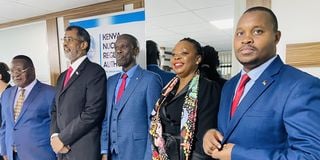Regulator hosts team, highlights Kenya’s nuclear progress

From left: KNRA board chairman Omondi Anyanga, NEA’s William Magwood, KNRA Director-General James Keter, Ms Ursula Diffu of NEA and Mr Edwin Chesire of the Nuclear Power and Energy Agency in Nairobi on August 21, 2024
Experts are calling for increased international cooperation in the safe and secure deployment of nuclear energy.
Kenya Nuclear Regulatory Authority (KNRA) Director General James Keter stressed the need for what he termed excellence in nuclear safety.
He spoke at a meeting in Nairobi on Wednesday, August 21, with Mr William Magwood, Director General of the Paris-based Nuclear Energy Agency (NEA). “Indeed, Kenya is at a pivotal point in its nuclear programme,” Mr Keter said.
He said KNRA is committed to enhancing its regulatory capability and will collaborate with industry leaders to advance Kenya’s nuclear programme. The country aims to have its first nuclear power plant operational by 2035.
Mr Keter, who was accompanied by KNRA board chairman Omondi Anyanga, added: “We cannot walk it alone. We require support to strengthen our regulatory framework, enhance our technical capabilities, and ensure our nuclear programme is developed responsibly and effectively.”
Mr Anyanga said Kenya recognises the potential of nuclear energy as a viable option for meeting its energy needs.
“We are equally aware of the responsibilities that come with the development of nuclear. Ensuring safety, security, and environmental sustainability of nuclear activities is of paramount importance,” he added.
Mr Magwood welcomed Kenya’s nuclear programme, saying Africa had become extraordinarily important in the nuclear agenda. “Besides having a young vibrant population, Africa also has a lot to do to grow its infrastructure and expand electrification,” he said, adding that his organisation was widely consulting with the aim of crafting and supporting “some kind of NEA in Africa.”
NEA, an intergovernmental organisation, facilitates cooperation among countries to achieve nuclear safety, with an emphasis on areas such as technology, science, environment, and law. It operates under the Organisation for Economic Co-operation and Development (OECD).
The officials met ahead of the four-day US-Africa Nuclear Energy Summit, which will be hosted in Kenya next week, bringing together experts to discuss how nuclear power can drive growth, especially in developing nations.
Many African nations, including Kenya, are considering nuclear energy as part of their strategies to increase electricity supply while reducing carbon emissions. According to the Nuclear Power and Energy Agency (NuPEA), a site for the The construction of Kenya’s first nuclear power plant has been identified along the coastal belt, and feasibility studies are underway.
In addition to sharing experiences from successful nuclear programmes in big economies, the
Nairobi summit will feature a high-level segment featuring Prime CS Musalia Mudavadi and
Energy CS Opiyo Wandayi, on international collaboration in harnessing nuclear energy.
It will include presentations and technical panel discussions on the practical steps needed to fully leverage nuclear energy’s potential to address global challenges. The event will culminate in the
Nairobi Declaration on the adoption of nuclear energy.
While renewable energy will continue to play a vital role in Africa’s energy future, experts highlight the potential of innovative technologies, such as small modular reactors, to provide both low-carbon energy and energy security.
Kenya’s total installed energy capacity includes 863 MW from geothermal, 838 MW from hydro, 436 MW from wind, 2 MW from biomass, 173 MW from solar, and 678 MW from thermal sources. As of 2023, the country’s total installed electricity capacity stood at 3,321 MW.





